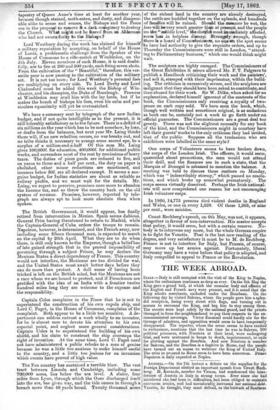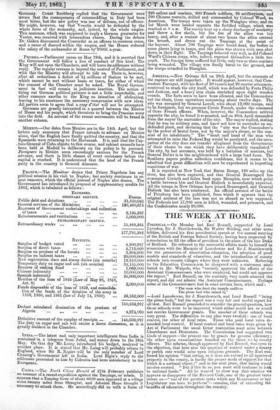THE WEEK ABROAD.
ITALY.—Italy is still occupied with the visit of the King to Naples, where the enthusiasm continues as deep as ever. On the 6th May the King gave a grand ball, at which the consular body and officers of the _English and French navy were present, and it is noted that the King admits merchants, excluded under the Bourbons. On the following day he visited Salerno, where the people gave him a splen- did reception, lining every street with flags, and turning out in masses to surround the King, and beg him to stay among them. The streets were kept solely by the national guard, and the priests thronged in from the neighbourhood to pay their respects to the ex- communicated sovereign. Victor Emanuel could hardly stir for the throngs of admirers, and opposition would seem to have temporarily disappeared. The reporter, whom the scene seems to have excited to enthusiasm, mentions that the last time he was in Salerno, 300 political prisoners, with Nicotera at their head, were undergoing trial, and were sentenced in heaps to death, imprisonment, or exile for plotting against the Bourbon. And now Nicotera is member for Salerno, and the Bourbon is a fugitive in Itome, and the people have turned out en masse to welcome the King of United Italy. The cries to proceed to Rome seem to have been numerous. Prince Napoleon is daily expected at Naples.
AIISTRIA.—On the 7th instant a debate on the supplies for the Foreign Department elicited an important speech from Count Rech- berg. M. Kurauda, member for Vienna, had condemned the inter- ference of Austria in Italy in strong terms. Ever since she had interfered she had been in difficulties, had been obliged to maintain enormous armies, and had uuendurably increased her national debt. Venetia, he thought, they must defend, as the bulwark of Southera Germany. Count Rechberg replied that the Government were aware that the consequences of intermeddling in Italy had been most bitter, but the new policy was one of defence, not of offence. He might, -however, say that' Venetia would be defended by the whole force of the monarchy, and, indeed, by the whole empire. `This sentence, which was supposed to imply a German guarantee for -Venice, was received with tremendous cheers. During the debate Dr. Giskra denounced the Concordat as an offence to common sense, and a cause of discord within the empire, and the House reduced Ithe salary of the ambassador at Rome by 20004 a-year.
Pnussi.A.—Parliament opens on May 19th, and it is asserted that the Government will follow a line of conduct of this kind : The Ring will not open the Chambers, and will'leave its addresses without reply. The regular revenue is beyond the control of Parliament, and with this the Ministry will attempt to tide on. There is, however, .after all reductions a deficit of 3i millions of thalers to be met, which cannot be met without loans or taxes, for either of which the consent of the Chamber must be asked. The Royal Govern- - anent in fact will remain in judicious inaction. The notion of tiring out German political patience is not a little improbable, and .Other rumours ascribe to the King an intention of abdicating, leaving to his successor the necessary compromise with new ideas. All parties seem to agree that a coup d'etat will not be attempted. Germans are greatly interested in a quarrel between the Elector of Hesse and his people, which threatens to bring the Prussian army into the field. An account of the recent movements will be found in another column.
Difsmeo.—Our dates from Mexico are to the 14th Apra, but the letters only announce that France intends to advance on Mexico alone, that the English have finally quitted the country, and that the Spaniards were returning to the Havannah. It is said that the Cap- .tain-General of Cuba objects to this course, and cabinet councils have been held at Madrid to deliberate on the policy to be pursued. _Foreigners in Mexico seem exceedingly anxious for the French advance, and there is little chance of overt resistance before the capital is reached. It is understood that the head of the French party in the country is General Almonte.
Faawcz.—The Noniteur denies that Prince Napoleon has any political mission in his visit to Naples ; but society continues to re- peat rumours, which the official journal of Naples also denies. The Ca-oveniment has introduced its proposal of supplementary credits for 1862, which is tabulated as follows : ExrEsisms.
ORDINARY SERVICE.
Public debt and dotations General services of the Ministries ...
Expenses of Government undertakings and collection
of taxes wa • 9,135,397
Reimbursements and restitutions - 5,060,000
EXTRAORDINARY SERVICE.
Extraordinary works ... •.• ..• 15,489,265 177,795,382 Definitive amount of the surplus of receipts .— ... 145;609,997 The duty on sugar and salt will excite a fierce discussion, as it is greatly disliked m the Chamber..
RECEIPTS.
Surplus of budget voted ... Surplus of direct taxes ... — .Surplus on produce of the forests Surplus on indirect taxes ... ... — ••• New registration dues and stamp duties (six months) Temporary duty on sugar and salt (six months) ... Reserve of sinking fund ... ... •••
'Chinese indemnity ... •■•■11 • • •
Spanish indemnity — ... ... •.. ...• Residue of the loan of 1855 (Law of May 28, 1858, Art. 8)...
Funds disposable of the loan of 1859: and consolida- tion of the funds of the flotation of the army in
1859,1860, and 1861 (law of July 14, 1860) ...
Deduct calculated diminution of the produce of
• • • • • •
4,300,997 4,713,000 3,304,000 20,000,000 19,850,000 34,185,000 1,069,000 10,000,000 25,000,000 2,000,000 26,162,000 150,583,997 4;974,000 Francs.
21,650,045 126,460;675 Isrine.—The latest and only important intelligence from India is contained in a telegram 'from Jabal, and -comes down to the 16th May. On that day Mr. Laing introduced his budget, analyzed in another place. It is stated that Mr. Laing will probably return to England, when Sir It. Napier will be the only member of Lord Canning's Government left in Lidia. Lord Elgin's reply to the addresses presented to him by Calcutta.had been satisfactory to the Europeans.
CHINA.—The North China Herald of 27th February publishes an account of a recent expedition against the Taepings, or rebels. It appears that a Taeping force of about 6000 men appeared at a village some twenty miles from Shanghai, and Adinival Hope thought it necessary to attack them. He accordingly hid so with 'a force of 350 sailors and marines, 300 French soldiers, 35 artillerymen, and 700 Chinese recruits, drilled and commanded by Colonel Ward, au American. The troops were taken up the Wanghpo river, and on 1st March were landed opposite the fortified village, which was reached at 8 a.m. The enemy kept up a sharp discharge of musketry and threw a few shells, but the fire of the allies was too heavy, and, after a contest of about two lours the allies entered the breach, and drove out the Taepings at the point of the bayonet. About 700 Taepings were found dead, the bodies in some places lying in heaps, and the plain was strewn with men shot down in their flight. The Taepings behaved very well, as did Colonel Ward's Chinese corps, who, indeed, exposed themselves a little too much. The foreign force suffered but little, only two or three marines being wounded. The village was finally burnt to the ground, and the troops returned to Shanghai.
AILERICA.—New Orleans fell on 26th April, but the accounts of the capture are still imperfect. It would appear, however, that Com- modore Farragut, with fleet of 30 vessels and 20 mortar schooners, contrived to reach the city itself, which was defended by Forts Philip and Jackson, and a heavy iron chain stretched upon eight wooden vessels. The forts seem to have been silenced, and the Commodore cut the chain, -these operations consuming about twelve days. The city was occupied by General Lovell, with about 12,000 troops, said to be foreigners, but we presume Creole French, under the command of three French officers. When, however, the Commodore arrived opposite the city, he found it evacuated, and on Nth April demanded from the mayor 'the surrender of the city. The mayor replied, stating that he was no military man, and knew not how to surrender an un- defended plea, and declaring that the "city was the Commodore's by the power of brutal force, not by the mayor's choice, or the con- sent of its inhabitants." The "heart and hand of the man who attempted to raise the Federal flag would'e paralyzed, and the occu- pation of the city does not transfer allegiance from the Government of their choice to one which they have deliberately repudiated." The city, by last accounts, was held by a battalion of marines, but General Butler is in the neighbourhood with a large land force. The Southern papers profess unbroken confidence, but it seems to be admitted that great difficulties will now be experienced in importing munitions of war.
It is reported at New York that Baton Rouge, 120 miles up the river, has also been captured, and that General Beauregard has evacuated Corinth and fallen back npon Memphis, near which point a battle between him and General Halleck is immediately expected. All the troops in New Orleans have joined Beauregard, and General Flalleck has also been reinforced. An official account of the battle of Pittsburg has been published, from which it appears that the original account of the loss was not so absurd as was supposed. The Federals lost 17,000 men in killed, wounded, and prisoners, and the Confederates nearly 20,000.































 Previous page
Previous page